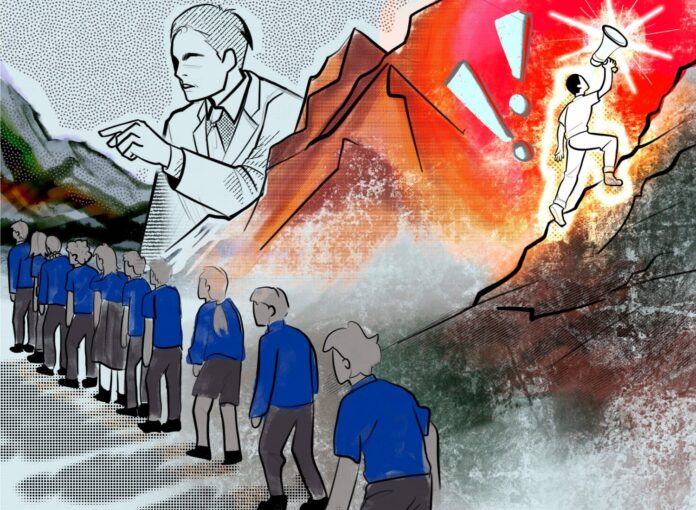There I was, with my fellow orientation leaders, sitting in a restorative circle. I had never heard of such a thing before. But after doing some research on the Prison Fellowship International handbook of restorative justice, I learned that restorative circles proactively “prevent conflict by connecting, building relationships and community and making decisions. They are also used reactively to respond to wrongdoing, conflicts or problems, and openly share with one another about difficult or painful issues.” I knew we were in this restorative circle to prevent any future harm from happening, for we had done nothing wrong.
Leading up to orientation week, we had recently found out that three students from the college faced disciplinary action for their actions at the inauguration of President Tom Stritikus. This news weighed heavily on the hearts of the orientation team, and some of the members were planning to protest by refusing to show up during orientation week in hopes of putting pressure on the college.
Because the orientation team is unpaid, it technically wouldn’t be a strike; nevertheless, the college was clearly concerned, as evidenced by their need to facilitate these restorative circles. This strike never happened, but it still sparked lots of productive conversations between us orientation leaders — questions about best practices for student leaders protesting and how censorship around the country is a genuine area of concern for students who care about social justice.
The restorative circles helped facilitate conversations with students concerned with the campus’ direction. As a philosophy major, I enjoy these conversation circles. I love listening to others’ ideas and exploring questions through dialogue to gain greater clarity. The conversations I had previously participated in were either debates or Socratic seminars, so this restorative circle was quite different from any conversation circle I had experienced before.
Rather than trying to answer some philosophical question, the restorative circles asked us to talk about our current feelings on everything happening on campus. This instruction gave students a chance to speak about their perspective, without allowing any one student to dominate the conversation.
I spent four years in the U.S. Air Force, where discipline was enforced from the top down. There were rigid hierarchies, and we were expected to follow orders without questioning them. When I transferred to Occidental in Spring 2025, I was excited to start using my voice for social justice. This restorative circle could have been a way for me to have my voice heard, but it fell short of my expectations in various ways.
For instance, I would have enjoyed the chance to ask my own questions, but instead I was only able to respond to the questions given to me. I was unable to refute any disagreements I may have had with other students or facilitators, resulting in little progress made in negotiating or learning more about our campus grievances.
Nonetheless, this was still an impactful experience for me, and I was able to reflect on what it means to try to be an activist on campus. Upon reflection, I realized that there is a lot in the world that I am unhappy with. Children are starving, human beings are sleeping on the sidewalks and innocent civilians are losing their lives in a war that seems perpetual.
My favorite thing about experiencing this restorative circle and the conversations surrounding campus protests was how we were able to come together and have constructive conversations about the injustice we see in the world. I was able to meet many new students who share the same passions as me, and they all accepted me with open arms. When times are difficult and we are seeing horrible things in the news, it is important to have a group of people that you can lean on and who are willing to go through the struggle with you.
There were also many things I learned during my experience that troubled me. The restorative circle made a certain malaise I sense on college campuses abundantly clear. Even while knowing how grim things look, I still find myself caught in this cynical ideology where it seems as if nothing will ever change. All around the country, people are being punished for speaking out against injustice, and it leaves students afraid to voice their opinions.
This mindset might lead to hopelessness, but at a time like this, it is vital that we remain hopeful. As many of the world’s citizens go to bed homeless and hungry, we can’t afford to stay silent. Even if no one is listening, we must speak out against injustice.
The ideology of this generation is becoming one of nihilistic cynicism, and pushback on such apathy is necessary. We cannot let the plague of cynicism poison the righteous voice that yearns for justice.
Today, more than ever, we need to hear your voice. To the administration, I greatly appreciate all the opportunities provided by the college, thanks to your supervision. However, this college has a legacy of social justice thanks to the passion and virtue of its students. For this legacy to live on, the students cannot be living in fear. If our voices are ignored, evanescing into an abyss, so too will our legacy simmer away.
Contact Edgar Zatarain at zatarain@oxy.edu
![]()































